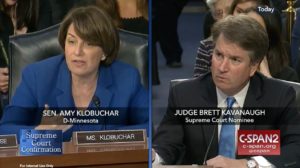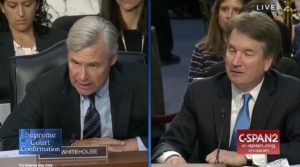Twice yesterday, Donald Trump’s nominee to the United States Supreme Court would not commit to protecting people with pre-existing conditions on the very same day that Trump’s Department of Justice argued in court in Texas that these protections should be overturned. In response, Brad Woodhouse, executive director of Protect Our Care, said: “The fix is in. If anyone still thinks that Trump’s position in the Texas case and the nomination of Judge Kavanaugh to the court is simply a coincidence – drop me a line – I have some ocean front property for you in Kansas.”
Watch for yourself:
Sen. Klobuchar: “The Texas case on pre-existing conditions, the Administration is taking the position that it’s unconstitutional – that part of the Affordable Care Act, down in the Texas case – taking the position that you could actually throw people off of their insurance if they have a pre-existing condition. So, let’s say that that law is found to be constitutional. Could the President choose not to implement the part of the law providing protections for pre-existing conditions?
Kavanaugh: Senator, that’s a pending case, so I cannot talk about it.
Sen. Whitehouse: In my office you told me that you could provide no assurance to me that you’d uphold a statute requiring insurance companies to provide coverage for pre-existing medical conditions. Is that still true here in public?
Kavanaugh: Well, I think, Senator, it’s important to understand the principle in play here.
Sen. Whitehouse: We’ve talked a lot about that, but is the statement you made – have I recited it accurately, and is it still true today that you can give no assurance that you would uphold the statue?
Kavanaugh: Well, Senator, judges like to explain their decisions.
Sen. Whitehouse: Yep, but I get to ask the questions. Usually you get to ask the questions because you’re an appellate judge, but today for half an hour I get to. So, is it still true that you can give no assurance that you would uphold a statute requiring insurance companies to cover pre-existing medical conditions?
Kavanaugh: So, to prepare for this moment, I went back and read –
Sen. Whitehouse: I really would like you to be as careful with your time as you can because I have a limited amount of time with you, so the quicker you can get to the answer – it could be as simple as yes or no.
Kavanaugh: But I can enhance your understanding of my answer if I explain it, I think.
Sen. Whitehouse: I really just want your answer on the record, I think I’m pretty capable of understanding on my own.
Kavanaugh: But, well, I want everyone to understand my answer. So there’s nominee precedent of how justices and nominees in my position have answered in the past, I’ll be succinct if I can. And all eight sitting justices –
Sen. Whitehouse: I know, you’ve actually already said this in the hearing, so people who are listening and are interested have actually already heard you say this.
Kavanaugh: Well, I think it’s really important so I want to –
Sen. Whitehouse: Say it again then.
Kavanaugh: I want to underscore it. All eight sitting justices in the Supreme Court have made it clear that it would be inconsistent with judicial independence, rooted in Article III, to provide answers on cases or issues that could come before us. Justice Ginsburg hints forecast, Justice Kagan talking about precedent, no thumbs up or down and I went back, Justice Thurgood Marshall was asked repeatedly in his hearing, what do you think about Miranda, what do you think about Miranda, what do you think about Miranda –
Sen. Whitehouse: Got it, everybody else does it and the answer is still no.
Kavanaugh: So the reason everyone else does it is rooted in judicial independence and my respect for precedent. So it’s a combination of my respect for precedent, nominee precedent, and my respect for judicial independence. So I can’t give assurances on a specific hypothetical.



